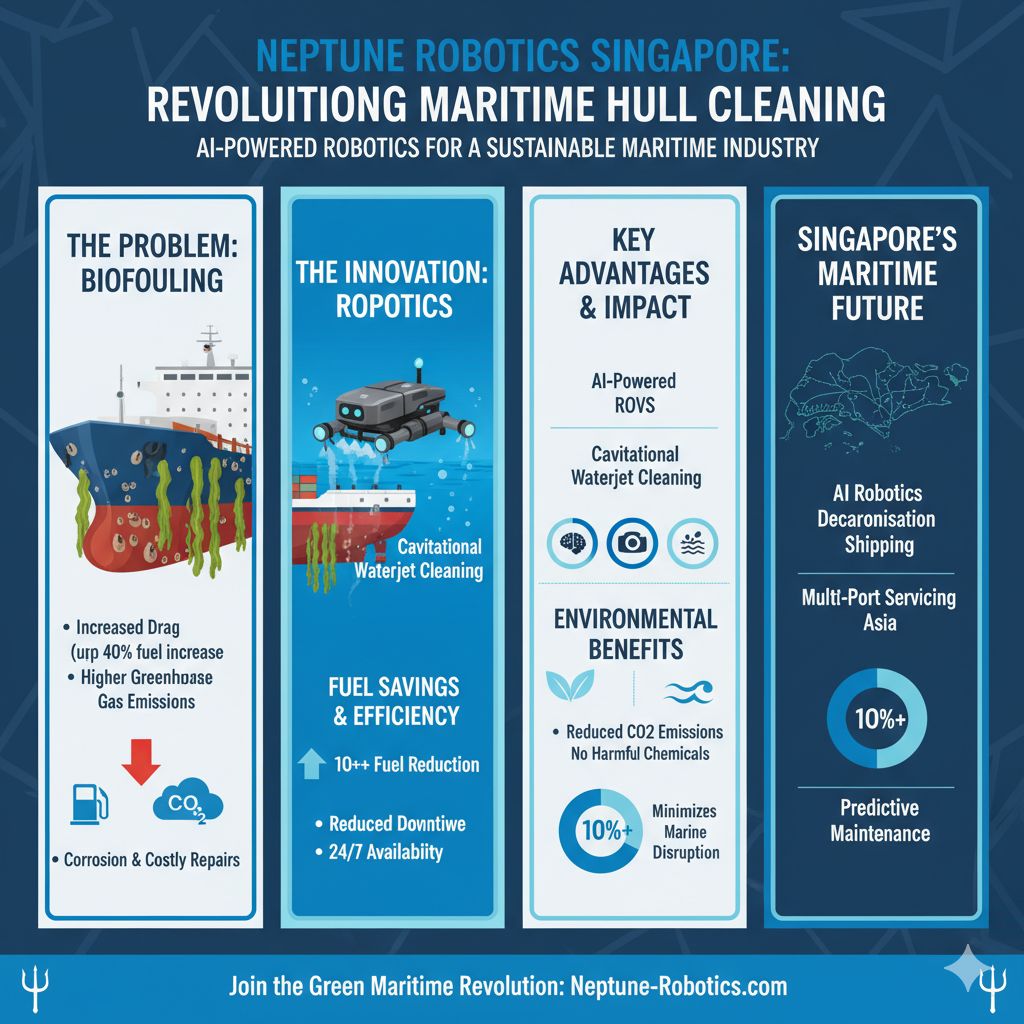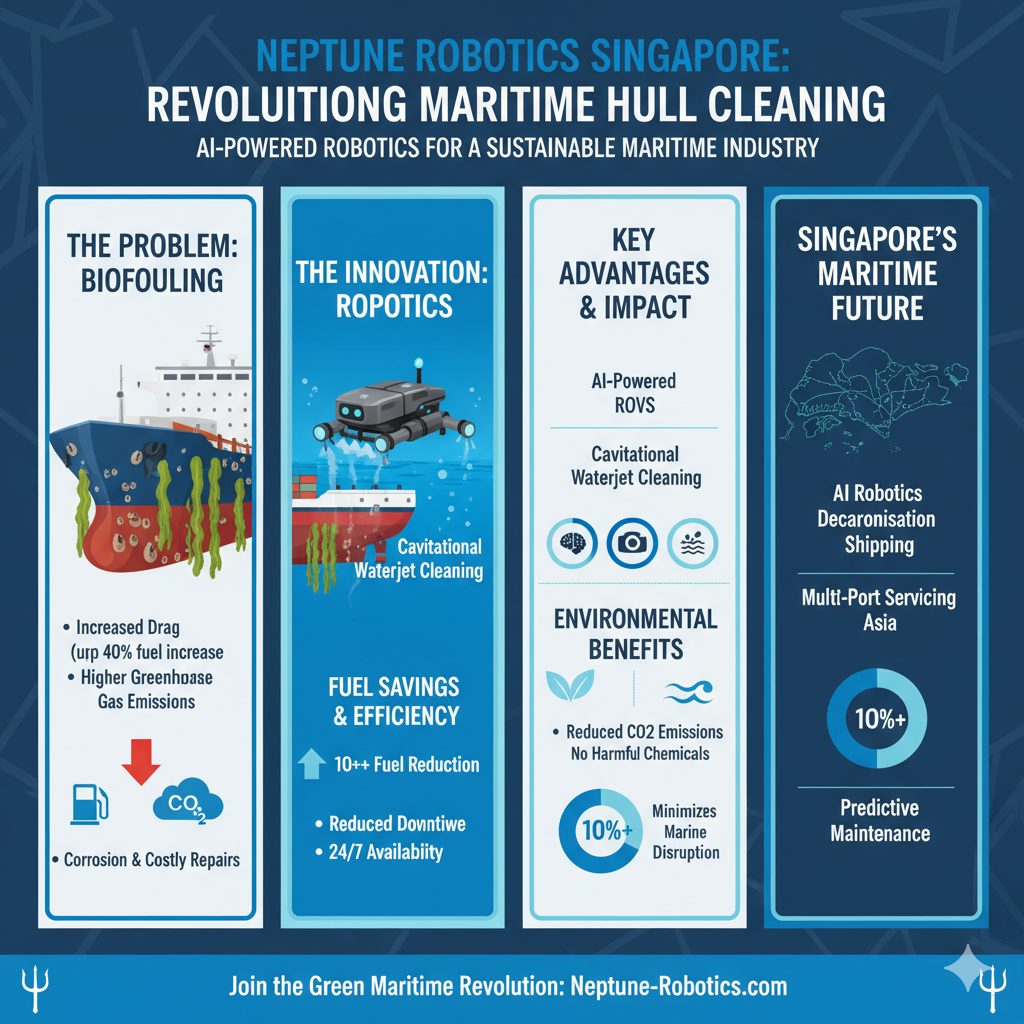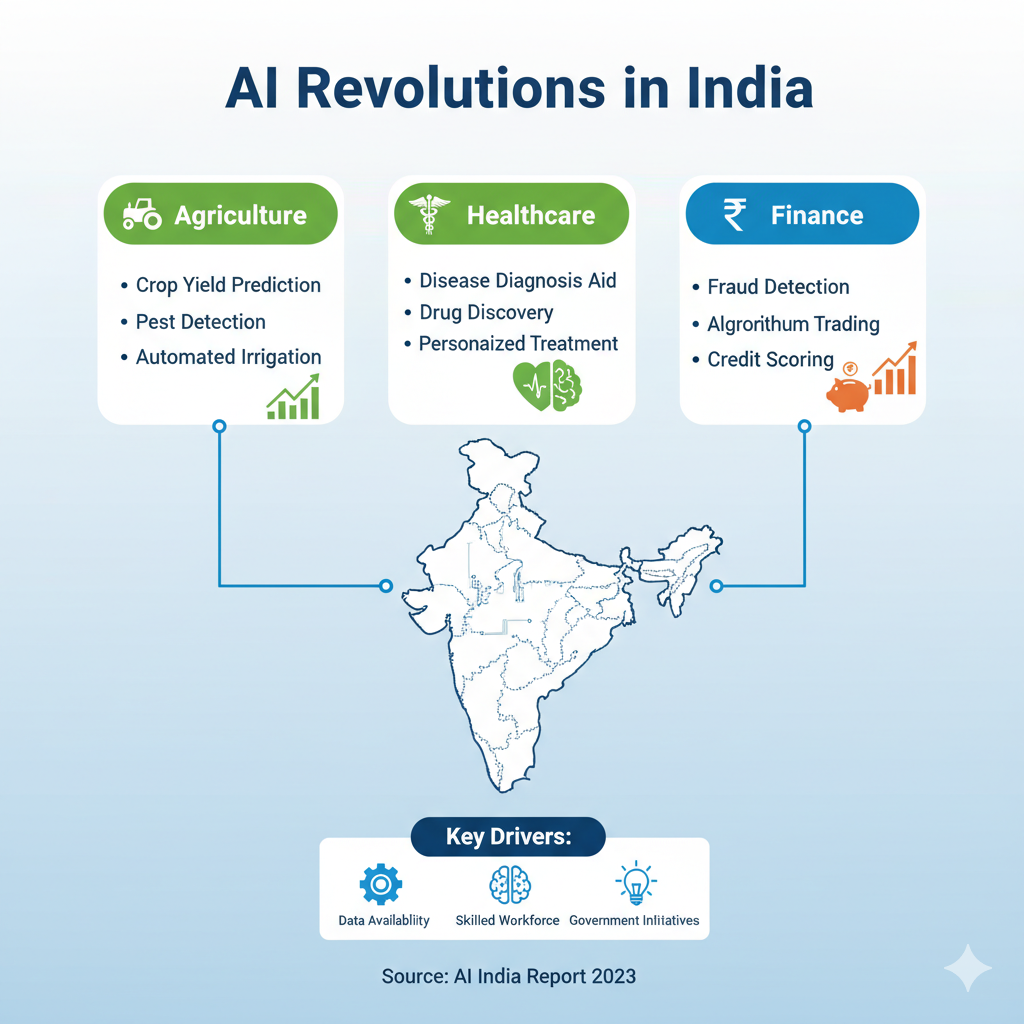In Singapore, a vibrant maritime hub, Neptune Robotics Singapore AI hull cleaning technology is transforming ship maintenance. As ships traverse busy shipping routes, their hulls accumulate biofouling—marine growth that increases fuel consumption and emissions. Traditional hull cleaning methods are labor-intensive, costly, and often harmful to the environment. Enter Neptune Robotics: offering robotic hull cleaning services Singapore that combine AI-powered underwater robots with eco-friendly technology to solve these challenges efficiently.
What is Biofouling and Why Does it Matter for Singapore Ships?
Biofouling refers to the accumulation of organisms like barnacles, algae, and mussels on a ship’s hull. This buildup:
- Increases drag, reducing speed and increasing fuel consumption by up to 40%.
- Causes higher greenhouse gas emissions, impacting environmental sustainability.
- Leads to costly repairs as corrosion accelerates under fouling layers.
Many vessels in Singapore’s busy ports suffer from this issue, making biofouling management Singapore ships critical to maritime operations and emission targets.
Neptune Robotics Vessel Cleaning Asia: Innovating with AI-powered Robotic Hull Cleaner Singapore
Neptune Robotics uses environmentally friendly robotic hull cleaners equipped with advanced sensors and AI algorithms. Their underwater ROVs (Remotely Operated Vehicles) provide:
- Precise biofouling removal without damaging hull coatings.
- 24/7 cleaning availability, boosting operational efficiency throughout Asia.
- Enhanced data collection through robotic hull inspection, enabling predictive maintenance.
This technology addresses multiple pain points in maritime maintenance, presenting a greener alternative aligned with Singapore’s sustainability goals.
Advantages of Robotic Ship Hull Cleaning Singapore: Fuel Savings and Environmental Impact
Using robotic hull cleaning delivers tangible benefits:
- Studies show maritime fuel savings robotic cleaning can reduce fuel use by over 10%.
- Reduces CO2 emissions, supporting international shipping decarbonisation efforts.
- Sustainable cleaning methods avoid harmful chemicals and excessive water pollution.
Neptune’s robots gently remove organic matter using a cavitational waterjet hull cleaning Singapore technique, combining efficiency with environmental responsibility.
Singapore Maritime Shipping Hull Cleaning: Case Study on Fuel Efficiency and ROI
A recent Neptune robotic hull cleaning case study Singapore highlights their impact on the Singapore-China shipping corridor:
- Deployment of robotic cleaners at key Singapore ports.
- Realized over 10% fuel savings per voyage, with consistent carbon emission reduction.
- Lower maintenance costs and faster turnaround compared to traditional dry docking.
Shipowners report enhanced ROI from reduced fuel costs, a critical metric in today’s volatile energy market.
Automated Biofouling Management Singapore: How Neptune’s Deep Tech Maritime Solutions Work
Neptune’s robotic fleet leverages AI for real-time adjustments to fouling levels, including:
- Automated hull cleaning Singapore maritime operations managed remotely.
- Underwater robotic hull cleaning technology capable of multi-port servicing.
- Intelligent debris collection ensures no secondary pollution.
This fleet robotic hull cleaning Singapore model is scalable, supporting Singapore’s position as a global maritime hub.
Environmental Sustainability Hull Cleaning and Maritime Industry Green Technology Singapore
Environmental stewardship remains a priority in Singapore’s shipping community. Neptune’s technology contributes to robotic hull cleaning sustainability impact by:
- Minimizing marine ecosystem disruptions compared to manual diver cleaning.
- Supporting compliance with IMO regulations on biofouling and emissions.
- Promoting maritime shipping green technology Singapore aligned with national policies.
Through continuous innovation and a commitment to sustainability, Neptune Robotics strengthens Singapore’s competitive edge in maritime technology.
How to Benefit from Neptune Robotics Multi-Port Vessel Cleaning in Singapore
Shipowners and operators can leverage Neptune Robotics by:

- Integrating Neptune Robotics international port coverage into their maintenance regime.
- Scheduling regular robotic hull cleaning to maximize fuel savings with robotic hull cleaning.
- Using detailed hull condition reports from Neptune Robotics robotic hull inspection.
These factors combine to increase operational efficiency and asset longevity in Singapore’s shipping ecosystem.
Future Outlook: AI and Robotics Decarbonisation Shipping in Singapore and Beyond
Neptune Robotics is paving the way for AI-driven decarbonized maritime transport:
- Expanding service networks with Neptune Robotics cleaning fleet expansion across Asia.
- Collaborating with global firms for AI robotics for maritime fuel reduction pilots.
- Continuing R&D on Neptune Robotics innovative cleaning methods for better results.
Singapore stands at the forefront of this maritime revolution, championing technology-led sustainability.
Frequently Asked Questions (FAQs)
1. What is robotic hull cleaning?
Robotic hull cleaning uses AI-powered underwater robots to remove biofouling from ships safely and efficiently.
2. How does robotic hull cleaning save fuel?
By removing fouling, it reduces drag, allowing ships to sail more efficiently and consume less fuel.
3. Is robotic hull cleaning safe for ship hull coatings?
Yes, technologies like cavitational waterjet cleaning clean effectively without damaging protective coatings.
4. How often should robot cleaning be performed?
Ideally, cleaning aligns with operational schedules; regular intervals help maintain optimal fuel efficiency.
5. Can robotic cleaning be done at multiple ports?
Yes, Neptune Robotics offers multi-port vessel cleaning, covering key shipping hubs including Singapore.
6. What environmental benefits does robotic cleaning deliver?
It reduces chemical use, water pollution, and carbon emissions compared to traditional methods.
7. How can I book robotic hull cleaning services in Singapore?
Shipowners can contact Neptune Robotics directly via their official website or Singapore office for scheduling.
8. Does robotic hull cleaning reduce ship maintenance downtime?
Yes, in-water robotic cleaning reduces dry docking time, keeping vessels operational longer.
Additional Resources and References
- Learn more about Neptune Robotics’ AI-powered vessel cleaning: Neptune Robotics Official Site
- Case studies on fuel and emission savings with robotic cleaning: Neptune Case Studies
- Maritime industry perspectives on decarbonization technology: Shipping Green Tech Report
In conclusion, Neptune Robotics Singapore is not just a pioneer in AI maritime technology but a key player in transforming the environmental and economic landscape of the shipping industry. By adopting this cutting-edge robotic hull cleaning technology, shipowners in Singapore can achieve significant fuel savings, reduce emissions, and ensure efficient vessel maintenance—all vital in today’s sustainability-focused maritime world.



